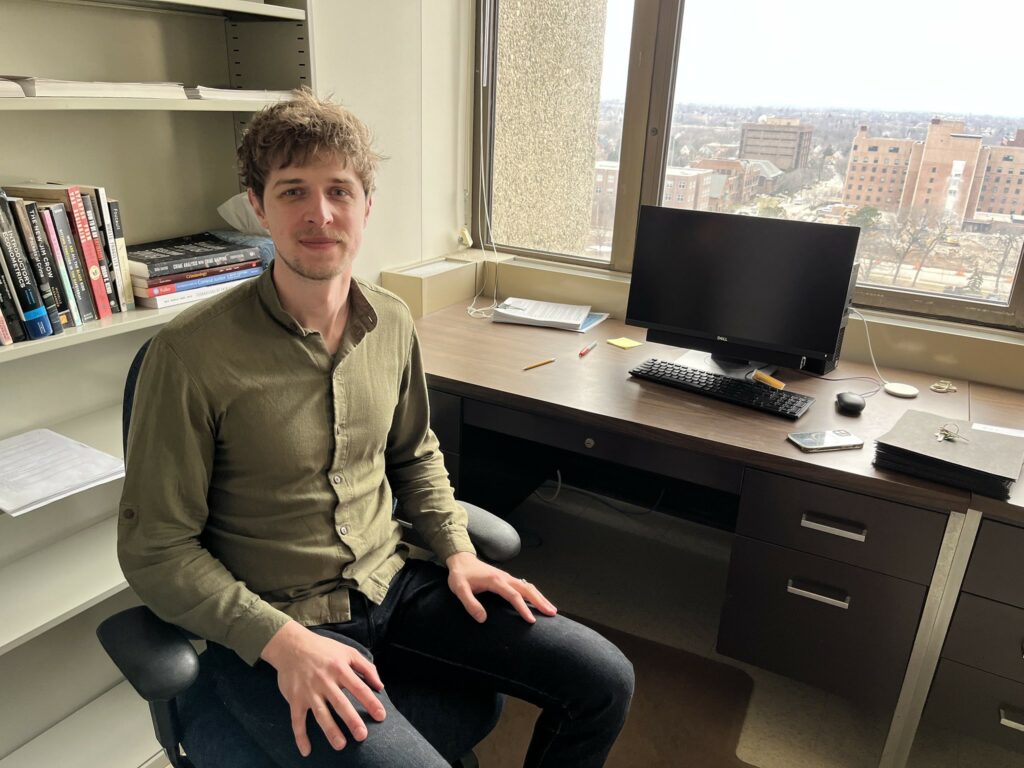Research Project Aims To Evaluate Crime and Justice in Milwaukee
First version of report from UWM research team expected to be published this fall. Community input sought.

Theodore Lentz, an assistant professor at University of Wisconsin-Milwaukee, wants his new research project to be a resource for those affected by the criminal justice system. Photo by Devin Blake/NNS.
A new data project about the criminal legal system in Milwaukee County is underway, and those working on it would like input from the community.
The goal of the project, which is in the early stages, ultimately seeks to take stock of criminal legal system data in Milwaukee County and identify needs and gaps in that data, said Theodore Lentz, assistant professor of criminal justice and criminology at University of Wisconsin-Milwaukee and the principal researcher on the project.
Lentz and his team, consisting of graduate students at UWM, are asking a range of key stakeholders, including government agencies and offices, the courts, law enforcement, community organizations and other nonprofits, about what issues are most affecting Milwaukeeans and what information is needed to promote key reforms that support people impacted by the justice system.
“I would really like this to be a community-centered project, focusing on the challenges for the people who are involved one way or another in the systems,” Lentz said. “That’s our lens – to keep those folks centered.”
In Milwaukee, this sort of lens will mean keeping it centered on people of color, as criminal justice systems in Milwaukee are “built on a really long time’s worth of racial hierarchy,” said Jed Oppenheim, program director at the Public Welfare Foundation, or PWF. PWF is the funder for Lentz’s project and works toward criminal and legal reform throughout the country. (PWF also funds the criminal justice reporter position at Milwaukee Neighborhood News Service but plays no role in the newsroom’s editorial decisions.)
“It’s important to really decipher what the issues are and what are the pressure points – everything from arrest and contact with the law to stays inside of prison,” said Oppenheim. “There are probably thousands of pressure points along that spectrum of where, either decisions could be done differently, or there are deep racial disparities in how decisions are made.”
Apart from this consistent aim, a project like this can go in many directions. Lentz is adapting as he goes.
One trend that has emerged thus far is the difficulty various entities doing work in this space experience in communicating their respective work with one another. Clear and reliable data about major or emerging trends can be rather hard to come by because, as Lentz said, “The various agencies and offices are a little bit siloed. There’s not an easy way for them to talk to each other with respect to data. Everybody’s just kind of collecting their own data … . It’s a little bit challenging to look across the system.”
“This is essential for inter-agency collaboration towards system-level change,” he added.
Lentz cited the developments surrounding Milwaukee County’s juvenile facility as an important example of where this sort of silo-breaking can be helpful.
“People are not always in agreement about whether or not it’s (the juvenile facility) good or bad or something else,” Lentz said. “We want to help inform decision-makers and key stakeholders in Milwaukee County about some of these issues that are going on so that they can use data to kind of build that into the decision-making process.”
Joseph Ellwanger, a longtime civil rights activist and a coordinator with the Milwaukee Inner-city Congregations Allied for Hope, or MICAH, said there are a number of instances where new data would be helpful as he and his colleagues advocate to legislators and decision-makers. MICAH is a nonprofit organization working on many justice-related issues, including mass incarceration.
“In Milwaukee, we’ve got programs like treatment alternatives and diversion, which send people with underlying issues of alcohol and other drug addiction and mental health issues to specialized treatment courts rather than to prison. And that has certainly been helpful in reducing the prison population a little bit,” Ellwanger said. “Some data connected to that which would be helpful is if we could really get the information on what percentage of people going into the prison system have underlying issues of alcohol and other drug addiction and mental health issues? We have approximate statistics … but we don’t know what it is for sure.”
Ellwanger said precise data like that would “give more ammunition” as he advocates for more money in the state budget for treatment alternatives and diversionary funding.
It is important to Lentz, though, to not just focus on the problems.
“One of the things that we really hope to do in our report,” he said, “is to also try to highlight the positive things that are going on in Milwaukee as it relates to the system, right? We want to move towards a narrative that, while Milwaukee is affected by critical crime and justice issues, it is also poised for progress and reform.”
The project is on a one-year timeline, and the plan is to publish the first version of the report in September or October. Lentz said he hopes the report will continue to evolve as the landscape changes.
For more information
For those who would like to provide information or comment on this project, Lentz can be reached at lentzt@uwm.edu.
Got something to say about crime and justice in Milwaukee? Here’s your chance. was originally published by the Milwaukee Neighborhood News Service.





















